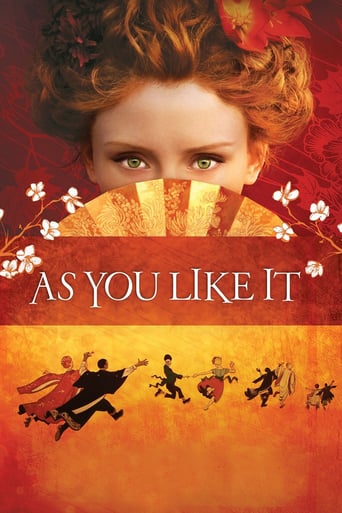runamokprods
Critics were pretty divided on this, but I thoroughly enjoyed it. Probably my second favorite of Branagh's films (both Shakespeare and not) after "Henry V". It's a sweet and joyful affair, with a load of fun performances, and a re-imagining by Branagh of the story taking place in 1880s Japan (!), which seems an odd idea, but actually ends up working quite well. Bryce Dallas Howard is a terrific Rosalind, perhaps my favorite I've seen. She makes the text completely comprehensible without losing it's poetry. She's funny, sexy and wonderfully lovable. (Why she hasn't become a bigger star I'll never know). David Oyelowo is her match as Orlando, making his love-sick swooning and single-minded romantic obsession tremendously appealing and human – never whiny (a danger in this role), and never losing his considerable charisma and smolder. This is a rare case where on-screen love at first sight is believable, endearing and hot. There are terrific supporting turns from Kevin Kline, Brian Blessed (excellent in a double role), Adrian Lester, Janet McTeer and Alfred Molina (just to name a few). There are places where one can carp: even in a comedy Howard's disguise as a boy would fool no one, and makes a number of moments feel silly (would it have been so hard to at least put all of her wild and distinctive hair under her cap instead of letting much of it come flowing out?). Sometimes Branagh interrupts his excellent, more classic visual style with a slightly wobbly stedicam 360, which call more attention to themselves than they should. And a couple of minor characters feel a less than needed in this cut down version. But those are small complaints. This is Shakespeare that isn't 'good for you', but that is as fun and playful (and occasionally quite tense) as any wonderful romantic comedy. Yes all the poetry and insights into human affairs are there, but they flow naturally, instead of making one feel force fed. I'd imagine this would be a great film for teens studying the play. It makes it immediate and alive, passionate and sexy.
tedg
Here's one of the most intriguing challenges in all the lands of imagination.Shakespeare invented much of what it means to be a modern human. But he did so in a very constrained way of communicating. The plays were all about language and geometry on how the come to us, and within that vessel he grew images. That sparseness was what allowed him to shape the language so finely, thus creating the poetic spins that find valence in us.Okay. If you have seen Shakespeare done as it originally was, you'll know what I mean. The plays work well when read silently or aloud as well. But how to translate to cinema? How to take something that is not visual until it enters us, and make it visual before it enters us and make the same magic?I love how people have tried. Most modern stage productions follow this cinematic challenge as well because now we are a visual society. Jarman, Greenaway, Luhrman and Taymor have done marvelous things with this challenge. Branaugh is from a different stripe, a sideways approach to this problem. He sometimes moves into pure cinema (Kate's mirrored Ophelia rant, the horses in "Much Ado") but he's primarily worried about stagecraft as theatrically defined. Here he does something different, something so ambitious I'm trilled to be alive for it. Its so clever.I did not see this at an appointed time, but stumbled on it after a discouraging day. In a sense, it saved my life. It really did. I watched the whole thing with one of those openmouthed grins.Here's what he did. He transported the setting to Japan and adjusted everything accordingly. Simple idea. No, its not just Shakespeare with different clothes. Its not just the plot fleshed out with some other setting. Its a translation to a visual expression. Japan has spent a few hundred years building, refining and constraining a visual grammar in much the same way that Northern Europeans did with language. We lose much of what we associate with the plays, that verbal poetry. What we get in its stead is something similar but visually rooted. To establish this of course you have to "show strong" in the beginning, and he does with a completely wordless intrusion, an invasion of guess what? A play!This Rosalind is exquisite, someone who knows how to shape the space around her the way British actors carefully shape their words. She anchors the whole thing, including an amazing epilogue. Really, you should save this for when you need your life saved, when you need to stroke down melancholy burrs. Though Branaugh ends with his familiar happydance, by then you will be ready for it, ready to fall in love all over again.Ted's Evaluation -- 3 of 3: Worth watching.
helenfeng78
I felt like I was watching community theater Shakespeare. The actors over-acted every line as if the audience wouldn't get it otherwise without long pauses and gasping. The editing felt like bad TV shows on the minor cable networks. But what had me most entertained was the pseudo Japanese theme which jumped in and out of an otherwise lack luster movie.Sorry all you theater grads that haven't made a living on the "craft", but I'm going to say this, even Shakespeare rattle off a few mediocre plays in his day. And this one tops the list. The adaptation was simplified and highlight to brilliant affect by Day Time TV quality acting, pretty pretty costumes, and a score that sounds like the the Disney Family After School Specials.For an okay actor, our director the hip to the current culture Mr. B seems to know little about the timing of dialog and editing, creating a film that is neither funny, dramatic, entertaining, nor relevant. But then again, maybe I'm sounding too film school-y, so I'll but it to terms that our general public can understand: This movie SUCKS! It is truly truly a waste to the thine Time. Indeed but in that kind, my lord, please feel free at your discretion. . . to watch a movie that blows sh-t up. It would be better stimulation for thy weary mind than this hack film.
colonel_green
After Henry V (which is objectively the best movie ever made), Much Ado About Nothing, Hamlet (two-disk DVD arrived in the same shipment as this), and Love's Labor Lost (haven't seen it), produced between 1989 and the present, Kenneth Branagh adapts the pastoral comedy As You Like It as a film. Sadly, this was never released in theatres outside of Italy (of course, the Bard isn't a huge draw at the box office), but it's now out on HBO DVD (and has a really annoying set of commercials appended to the start that you can't fast-forward or "menu" through).Anyway, when I first heard that Branagh was directing this, I was both thrilled and a bit disappointed, the latter owing to the decision to film one of the comedies rather than one of the tragedies or histories (I'd kill to see him film Macbeth; what's that, witches? You say that if I...). But, take what you can get. Anyway, this is set in 1880s Japan "for some reason" (as one review put it), and, truly, the setting doesn't add a whole lot. Apart from ninjas, which are always cool.For those who don't know the plot (which, there's a good chance you mightn't, this not being Hamlet): The good Duke Senior has been banished from his kingdom by his evil brother, Duke Frederick, and fled with some accompanying lords (most notably Jacques) into the forest of Arden (here pronounced "Ard-en" rather than "Ar-den"); however, the good Duke's daughter, Rosalind, is still in court, being kept their by the evil Frederick because his own daughter, Celia, refuses to live without her. In the play, the sense is that this has been the case for a while, but the film actually begins with the banishment, so the whole affair from start to finish seems to last for a couple of weeks. Anyway, Frederick eventually decides to banish Rosalind too, because everyone loves her and feels sorry for her; however, Celia runs off with her, and they take the court clown (Touchstone) with them for no particular reason. Also fleeing into the forest are Orlando and his servant Adam, to escape the wrath of Orlando's jerk older brother; Orlando is in love with Rosalind. Rosalind adopts the guise of a man named Ganymede (two maids shouldn't travel alone; although they then decide to bring an actual man with them, although he's a clown, so maybe he doesn't count), and Celia starts calling herself Aliena, and they settle down in a shepherd's cottage. There are about five different love stories preceding from this point. And eventually everyone lives happily ever after.In terms of actors, let's first account for the usual Branagh people (Shakespeare roles in brackets):Richard Briers (Bardolph, Leonato, Polonius, Nathaniel) is Adam, Orlando's (and Orlando's father's) faithful servant. A rather small part for him, but he's got one great little scene early on. - Patrick Doyle (Soldier, Balthazar, better known as his composer, but whenever there's singing to be done, he's in) as Amiens. He actually has some dialogue other than singing. - Jimmy Yuill (Captain Jamy, Friar Francis, Alexander, Dull; perennial bit-player) as Corin the shepherd. - And last, but certainly not least, the man, the myth, the legend: Brian Blessed (Duke of Exeter, Antonio, King Hamlet's Ghost). Brian Blessed fans, this is your movie, because he plays not one, but two parts: both good Duke Senior and evil Duke Frederick (one wears white, the other wears black).Branagh himself is conspicuously absent here (he almost played the part of Touchstone or Jacques, but ultimately cast Alfred Molina and Kevin Kline in those parts; Molina is great as a very Chaplin-esquire character; Kline has the famous "All the world's a stage" soliloquy). Despite this being set in Japan, there are only two Japanese actors worth noting, playing Sylvius and Phoebe (the pathetic shepherd and his cold mistress), but we also have two black actors as brothers Orlando and Oliver (at least we're not being sold Keanu and Denzel as siblings this time). Romola Garai is Celia, and she's also quite good (mostly she does physical comedy/mugging to all the craziness going on around her).And finally, there's Bryce Dallas Howard as Rosalind. She is, simply, great; she's the equal of Emma Thompson or Kate Winslet in Branagh's other Shakespeare films. She has what would seem to be the difficult role of pretending to be a man, but it's not actually hard at all, because the director's strategy seems to be to have everyone just act like she looks like a man, without making any attempt to actually make her seem one (her disguise really amounts to cutting her hair shorter, and occasionally wearing a hat). She's a delight the whole way through, and most of the actual humour really comes from the surreal way everyone acts like she's a man when really she's Bryce Dallas Howard with a haircut and (occasionally) a hat.Now, on to negatives; it really comes down to the fact that this is a rather slight play, and thus a rather slight film. There's nothing remotely approaching any of the dozens of profound moments in Henry V here (which, again: best film ever); it's mostly just fun performances and witty character interaction. All the same, if you enjoy Branagh and/or Shakespeare's comedies, I'd recommend giving it a look.And Kenneth? Seriously, Macbeth.





